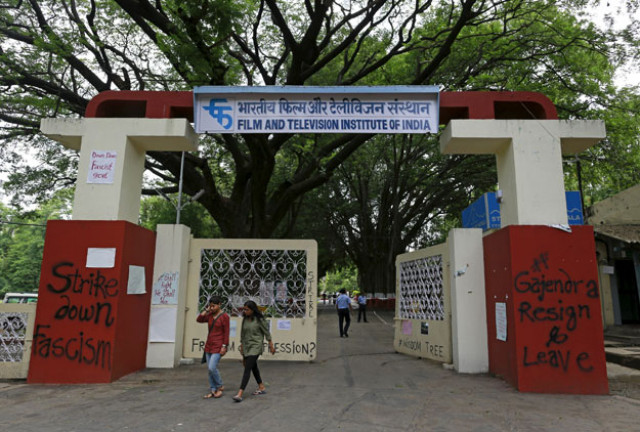Hindu nationalist pick for India film school alarms students, industry
Film-maker Kiran Rao says anyone who is sane, and who thinks, will be worried

Students walk past the graffiti-painted entrance of the Film and Television Institute of India (FTII) in Pune, India. PHOTO: REUTERS
In the world's largest film industry, some people fear the choice signals a push by Prime Minister Narendra Modi's Hindu nationalist party for control of India's most powerful medium.
 Dharmendra Jai Narain, director of the Film and Television Institute of India (FTII), speaks on a phone outside his office in Pune, India. PHOTO: REUTERS
Dharmendra Jai Narain, director of the Film and Television Institute of India (FTII), speaks on a phone outside his office in Pune, India. PHOTO: REUTERSNew appointments at the film school have rattled an industry already upset by changes to India's powerful film certification panel, after its chairman and a handful of members resigned, blaming government interference.
Read: 6 cringeworthy quotes by Hindu nationalists
"Anyone who is sane, and who thinks, will be worried," said film-maker Kiran Rao, who spoke out against the new censor panel. "This is affecting the way we function."
 Striking students rest under an improvised tent at the Film and Television Institute of India (FTII) in Pune, India. PHOTO: REUTERS
Striking students rest under an improvised tent at the Film and Television Institute of India (FTII) in Pune, India. PHOTO: REUTERSThere is no evidence yet that Modi's 14-month-old government has significantly influenced the tone or content of films, but concerns are growing that it could rein in the industry's liberal outlook in an overwhelmingly conservative society.
India's popular films, though still laden with song-and-dance routines, have recently tackled weightier topics, such as human rights abuses by the Indian army in the disputed Himalayan region of Kashmir, homosexuality and the caste system.
 Staff members speak next to graffiti painted on a wall of an administrative office at the Film and Television Institute of India (FTII) in Pune, India. PHOTO: REUTERS
Staff members speak next to graffiti painted on a wall of an administrative office at the Film and Television Institute of India (FTII) in Pune, India. PHOTO: REUTERSThe 55-year-old film school, in the western city of Pune near Mumbai, India's capital of film and finance, prides itself on quality cinema and has turned out some top film-makers. It is governed by the Ministry of Information and Broadcasting.
Read: India's Modi pledges development with Hindu nationalism
Critics see the selection of Gajendra Chauhan, an actor known for little apart from his role in a 1980s TV serial based on the Sanskrit epic, the Mahabharata, as the latest in a string of political appointments to cultural and academic bodies.
 A man walks past a graffiti-painted wall of a toilet at the Film and Television Institute of India (FTII) in Pune, India. PHOTO: REUTERS
A man walks past a graffiti-painted wall of a toilet at the Film and Television Institute of India (FTII) in Pune, India. PHOTO: REUTERSIndian film, particularly Hindi-speaking Bollywood, many of whose best known actors, directors and technicians come from the school, is wildly popular in a country where one in four people is illiterate.
The films have long been one of the few aspects of Indian life that transcend barriers of caste and creed: for example, marriages between members of India's Hindu majority and its tiny Muslim community are not unusual, on-screen and off.
A certain agenda
But opponents of Modi's government say hardliners in his Bharatiya Janata Party want to turn secular India into a Hindu-first nation.
"Every single step this government has taken, whether in culture or education, has been to push a certain agenda," said Shanta Gokhale, a novelist and theatre critic in Mumbai.
 Staff members walk past graffiti painted on a road at the Film and Television Institute of India (FTII) in Pune, India. PHOTO: REUTERS
Staff members walk past graffiti painted on a road at the Film and Television Institute of India (FTII) in Pune, India. PHOTO: REUTERSChauhan, who campaigned for Modi's BJP last year and has been a party member since 2004, told Reuters his political views would not influence his work at the film institute.
"Everyone has a political ideology they identify with," Chauhan said. "So do I. But that ideology does not come in the way of my work."
Read: Fears grow about Hindu 'Modi-fication' of education
Also appointed as a school governor was documentary film-maker Anagha Ghaisas. Her work includes a pro-Hindu film on the 1992 demolition of a mosque in the Hindu holy city of Ayodhya, an event that sparked riots in which about 2,000 people died.
 A staff member walks past a graffiti-painted wall of an administrative office at the Film and Television Institute of India (FTII) in Pune, India. PHOTO: REUTERS
A staff member walks past a graffiti-painted wall of an administrative office at the Film and Television Institute of India (FTII) in Pune, India. PHOTO: REUTERSGhaisas told Reuters she was not ashamed of her background but would work to improve the institute, and for its students.
"If you get a complete majority, why would you call members of other parties to participate? It’s a political appointment, so of course you will choose people you are confident about," she told Reuters.
After the censors' resignations in January, the government appointed director Pahlaj Nihalani as its chief. Nihalani made his name with adult comedies in the 1990s and his latest work was a campaign video for then-candidate Modi.
Nihalani did not respond to requests for comment.
The new censors have demanded cuts in profanity and references to homosexual relationships and extramarital affairs.
One recent demand was to bleep out the usage of "Bombay", the Anglicised, colonial-era name for Mumbai.
"It makes me incredibly scared," said Rao, who has worked in the industry for 15 years. "This sort of expression is essential to a democracy."



















COMMENTS
Comments are moderated and generally will be posted if they are on-topic and not abusive.
For more information, please see our Comments FAQ